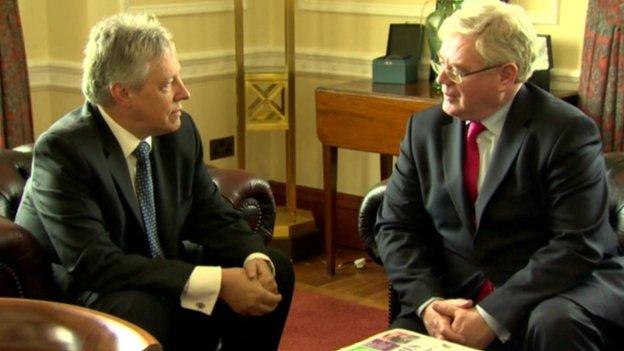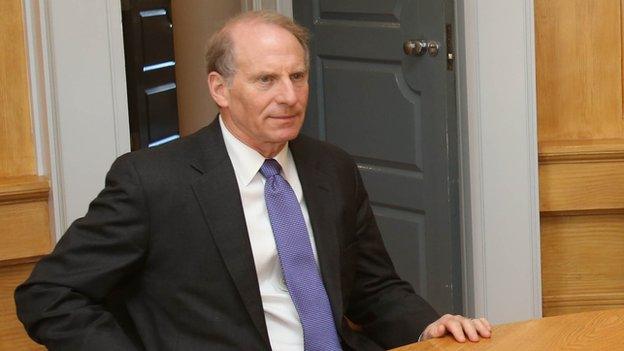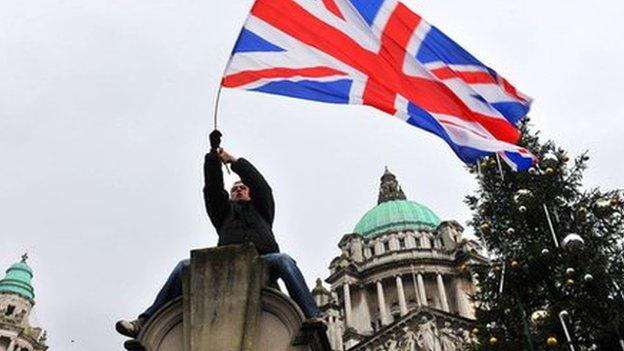Theresa Villiers urges Northern Ireland parties to fix talks dates
- Published
Theresa Villiers urged the Northern Ireland parties to "keep at it"
The secretary of state has said it is "really crucial" Northern Ireland's five main parties fix dates for talks as soon as possible.
Theresa Villiers said it was important to take advantage of the next few weeks before the height of the parading season.
Two rounds of three-day talks on flags, parades and the past were announced last week.
However, so far no dates have been arranged.
Over the Christmas and New Year period US diplomat Dr Richard Haass and his associate, Dr Meghan O'Sullivan, failed in their attempts to reach all-party agreement about the three issues.
Ms Villiers told the BBC: "I think it's really crucial for the parties to fix those dates.
"I very much hope that [Ulster Unionist leader] Mike Nesbitt will be at the table as well, because I think it would be important to have as many of Northern Ireland's political leaders at the table as possible.
"It is a crucial time. There are a limited number of weeks before we hit the height of the parading season and the assembly recess.
"It is important, as the prime minister said in his article a few weeks ago, to take advantage of the next few weeks to make progress, because ultimately an agreed way forward on flags, parading and the past would be a tremendous boost for Northern Ireland."
She added: "I think now is the time for Northern Ireland's political leaders to keep at it, to stick to the process and to engage in a more intensive discussion."
Ulster Unionist sources have indicated they will send a delegation to the new talks.
However, they are continuing to insist they will not engage in any negotiations about the legacy of the Troubles until after they have at least seen the outcome of the review by Lady Justice Hallett of the issue of On the Runs.
'Job needs finishing'
Ms Villiers said she recognised agreement on the legacy of the past would be difficult or "impossible" before Judge Hallett reports on the On The Runs issue, but hoped there was "room for manoeuvre" in which the unionist parties could still engage in conversations about a way forward.
"I continue to be optimistic when I hear the willingness of Northern Ireland's political leadership to engage on these crucial issues. I think there's a recognition that this job needs finishing, that real progress was made under the auspices of Richard Haass.
"A lot of common ground was found. I think now is the time for Northern Ireland's political leaders to keep at it, to stick to the process and to engage in a more intensive discussion."
First Minister Peter Robinson said: "I'd like it to take place (the first meeting) as soon as possible.
"But I do enter the caveat that while we can commence those talks, and indeed should commence those talks, we can't obviously deal with the issues related to OTRs, the justice system, in the absence of Justice Lady Hallet's report.
"I've made that clear, Mike Nesbitt has made that clear, that we need to see the outcome of that report before we can take any decisions on justice matters in relation to the past."
'Feet dragging'
Sinn Féin's Conor Murphy said the only thing blocking the talks was "unionist intransigence".
"The DUP and UUP have both been dragging their feet on arranging dates for discussions to take place," he said.
"It is also disingenuous for the British secretary of state to attempt to distance her government from responsibility for unionist intransigence.
The SDLP's Alex Attwood said both the British and Irish governments should get involved in the talks.
"While the secretary of state is right to urge a date for talks be confirmed urgently, the secretary of state is wrong to put all eggs in that particular basket," he said.
"The SDLP has said repeatedly to the secretary of state and to the other parties that the talks process that offers the best hope and the most viable outcome is one that includes the parties and the two governments."
- Published9 June 2014

- Published12 March 2014

- Published12 December 2014
